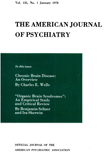Prediction research and the emergency commitment of dangerous mentally ill persons: a reconsideration
Abstract
The author suggests that research on the prediction of violent behavior does not support the unqualified conclusion that the accurate predictions of violence is impossible under all circumstances or that psychiatrists, psychologists, and others will invariably overpredict its occurrence by several orders of magnitude. Further, he suggests that there are theoretical reasons why one could expect that one set of circumstances--those which typically apply in the short-term emergency commitment of mentally ill persons predicted to be imminently violent-- may be exempt from the systematic inaccuracy found in the current research.
Access content
To read the fulltext, please use one of the options below to sign in or purchase access.- Personal login
- Institutional Login
- Sign in via OpenAthens
- Register for access
-
Please login/register if you wish to pair your device and check access availability.
Not a subscriber?
PsychiatryOnline subscription options offer access to the DSM-5 library, books, journals, CME, and patient resources. This all-in-one virtual library provides psychiatrists and mental health professionals with key resources for diagnosis, treatment, research, and professional development.
Need more help? PsychiatryOnline Customer Service may be reached by emailing [email protected] or by calling 800-368-5777 (in the U.S.) or 703-907-7322 (outside the U.S.).



